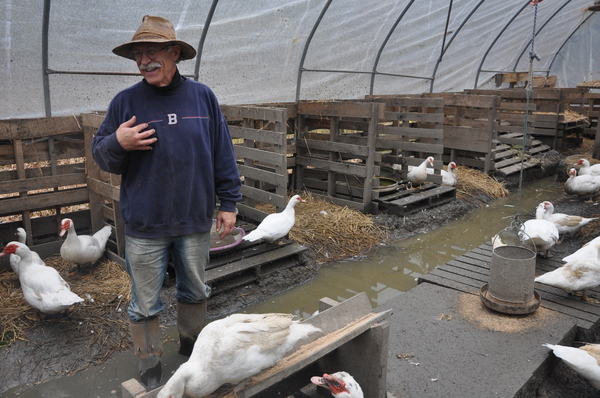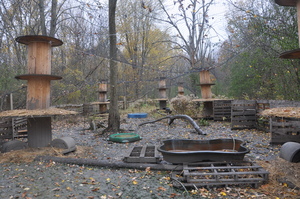OmniUnum Farm: 'Heaven on earth' for Muscovy Ducks
In my Farm to Fork series, I visit local farms and share what I learn.

David Beemer stands in the stream he diverted for his Muscovy ducks.
Corinna Borden | Contributor
You never know who you are going to sit next to at FridayMorning@Selmas, or in my case, who will sit on you.
I sat next to David Beemer, of OmniUnum Farm, and Antoinette Benjamin, of Food for all Seasons Catering. As they spoke to me about the world of the Muscovy duck, two-day-old Muscovy ducklings nestled their warm, downy, wiggling bodies into my neck, tucking themselves in under my hair, as if I were their mama.
After such a bucolic introduction, I had no choice but to visit the farm.
A former investment banker and hospital administrator, David Beemer changed the trajectory of his life after experiencing a health scare while working in Namibia. He left his desk and began raising his own food. “When I first got out here… I put like, 800 pounds of cow manure and Michigan peat in my asparagus bed. And I just said — this is ridiculous. It can’t be this tough. And that is how I first got into poultry.” Beemer attributes his thriving vegetables to regularly fertilizing his garden with duck pond water and soiled straw from his fowl charges.
Beemer began his Muscovy flock with 18 ducklings from Quaker Hill Farm three years ago. The ducks have a varied diet, including vegetables from the gardens they fertilize, organic crumble, kelp tea, comfrey, worms, fruit, algae and insects they forage themselves. Beemer has constructed an “annex, an aviary, a spa and a playground” for the birds out of recycled items from craigslist.com and diverted a small drainage stream and natural spring in order to ensure a constant supply of fresh water to the flock. His 12,500-foot enclosed area is tall enough for the birds to fly.
“My objective was to create an environment for animals to have heaven on earth.”
As Beemer explains, Muscovy ducks “are perching birds, not wading birds. All ducks have an oil gland — that is what helps their buoyancy and everything in water — but because the Muscovy is a perching bird bred to live in trees and out of the water and bred by farmers … to handle pest control in their crops (they eat all the insects). In the summer time, you won’t even see any mosquitoes out here… they are like pythons with legs!”
Beemer continues to describe the birds, exuding delight and joy. “A lot of people think of them as mute, but they are not mute — they whisper, and when they are happy they trill.”
Beemer’s all-white birds (for ease of dressing) “exceed standard. If you go anywhere and read about the standard for the breed… they exceed standard almost to the point that it is absurd. They look for ducks that are seven pounds and for drakes that are nine pounds. Mine are nine pounds dressed out, and they can be as much as 15 pounds.” He is particularly proud of five ducks born in early June. “I swear to you that I will put those five ducks against any Muscovy Ducks in the world. They are the finest free-range, all-organic Muscovy Ducks anywhere.”

Beemer constructed a "playground" for his flock out of recycled items, in line with the principles of Permaculture.
Corinna Borden | Contributor
Check in next week to learn why David Beemer choose Muscovy Ducks to fertilize his garden and what Antoinette Benjamin has to say about their flavor and cooking them.
Corinna wrote a book about many things, works with the Westside Farmers Market, and spoils her backyard chickens.

